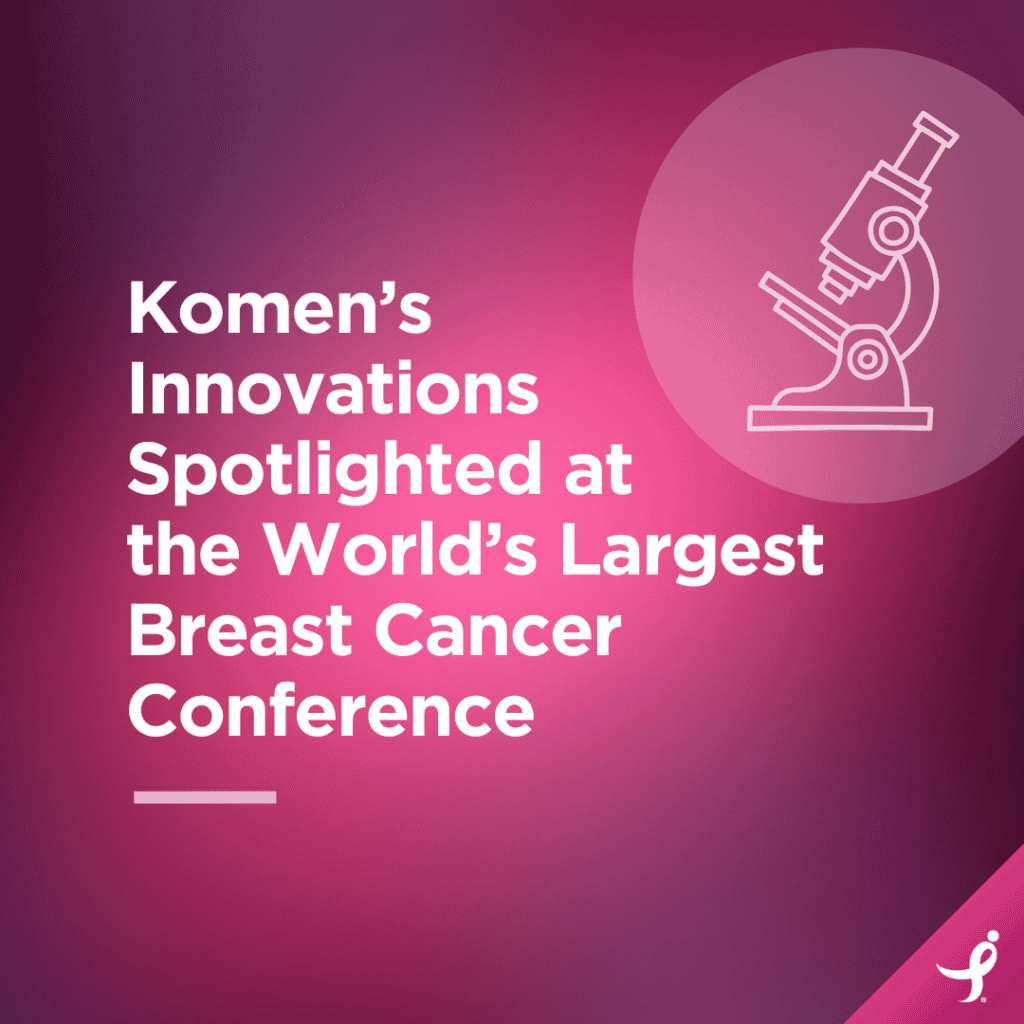This week, the San Antonio Breast Cancer Symposium (SABCS) is convening nearly 11,000 doctors, researchers and patient advocates to discuss the latest advances in breast cancer research. Susan G. Komen is showcasing its 360-degree approach to tackling breast cancer in four presentations at this year’s conference.

Improving Patient Navigation Services for those with Metastatic Breast Cancer
Patient navigation services play a crucial role in guiding patients and their families throughout their breast cancer experience. However, patient navigators participating in focus groups identified gaps in their training and preparedness to meet the unique needs of people living with metastatic breast cancer (MBC). To fill this gap, Komen created a new patient navigation training course focused on MBC. Julie McMahon, M.P.H., director of community health programs is presenting outcomes of the course at SABCS (Poster #P4-02-11). The course has already had significant engagement, with 98 participants enrolling within the first six months, and 100% of participants reporting increased confidence in meeting the needs of people with MBC.
McMahon is hopeful that the course’s impact will spread beyond Komen’s PCC. “We’re sharing our resources and insights with key partners like the MBC Alliance and the National Navigation Roundtable to elevate the quality of navigation services industry-wide,” she says.
Alleviating Financial Stressors for those with MBC
Breast cancer is the most expensive cancer to treat in the U.S., and 73% of cancer survivors will experience financial toxicity. Financial toxicity can have a serious impact on a person’s quality of life and ability to complete their treatment. Komen’s Financial Assistance Program (KFA) provides direct cash assistance to qualifying individuals diagnosed with breast cancer, and 27% of those who received funds last year were living with MBC. Shelby Lautner, Ph.D., manager of community health evaluation, is presenting the impact of Komen’s KFA on the treatment experience of those living with MBC (Poster #P3-08-13).
“In the literature, we have learned that lower income groups often delay or skip filling prescriptions or avoid scheduling breast cancer appointments due to cost,” says Lautner.
The team surveyed 1,668 people living with MBC that received financial assistance through the program. They found 54.3% of respondents indicated that the assistance helped them avoid skipping medications, and 61% indicated the assistance helped them make it to their doctor’s appointments.
While these results show direct cash assistance may alleviate financial stress for some of those living with MBC, the team stressed that systemic change, including support from policy makers, is crucial for addressing the complex issue of financial toxicity.
Engaging Breast Cancer Survivors in Research
Researchers need data to advance personalized care and discover cures for breast cancer. Unfortunately, researchers currently rely on small subsets of patients that are not representative of all breast cancer patients in the U.S. Komen’s breast cancer research registry, ShareForCures® is seeking to change this by engaging breast cancer survivors and patients as research partners. Komen data science manager Jessica Epps, Ph.D. is presenting a first look at participants who have enrolled in ShareForCures at SABCS (Poster #P2-08-01).
“We aim for ShareForCures to be a robust registry that is as diverse as the breast cancer community itself and to offer an opportunity for people from all backgrounds to participate in research,” says Epps.
In the first year of ShareForCures, the team successfully recruited 448 participants across 45 U.S. states and 1 U.S. territory. Participants remained engaged with the registry, with 60% of the participants completing at least one data collection activity, such as completing a survey or providing a saliva sample. This strong initial engagement suggests a solid foundation for long-term participant retention and robust data collection within the registry.
So far, the diagnoses reported by participants are consistent with national prevalence estimates, and participants living with metastatic breast cancer are over-represented, indicating that the registry may be particularly valuable for studying this high-need population. These findings highlight the potential of ShareForCures as a critical resource for advancing breast cancer research, especially in understanding metastatic disease and improving inclusivity in biomedical studies.
Supporting the Diagnosis of Inflammatory Breast Cancer
Inflammatory breast cancer (IBC) is a rare and aggressive form of breast cancer that often has symptoms such as swelling and redness of the breast. It can be hard to see IBC on a mammogram because it frequently lacks a breast lump. In addition, the rapid onset of symptoms, which may be first mistaken for an infection or mastitis, means that IBC is often diagnosed later than other types of breast cancer, which results in worse outcomes. At SABCS, Komen scientific programs manager Lindsey Anstine, Ph.D., is presenting the impact of the IBC Scoring System Online Tool – Komen’s answer to this important issue (Poster #P4-06-13).
This easy-to-use tool allows clinicians to quickly calculate a patient’s likelihood of having IBC. The tool uses diagnostic criteria developed through the Susan G. Komen-IBCRF (Inflammatory Breast Cancer Research Foundation) IBC Collaborative in partnership with the Milburn Foundation and has recently been validated by two of the leading IBC Centers in the U.S. Efforts to spread the word about this important tool through educational materials and clinical conferences are paying off. As of June 2024, the tool has already been accessed across the U.S. and in over 60 countries.
Anstine expressed enthusiasm about the impact the online tool could have. “Widespread adoption of the IBC Scoring System and the online tool can help increase diagnostic accuracy, guide treatment decisions and potentially lead to more timely diagnosis and improved outcomes for this rare and understudied breast cancer,” she says.
A Promising Time in Breast Cancer Research
These presentations are only a fraction of the nearly 1900 presentations at SABCS 2024. Advances in breast cancer research are happening at a rapid pace and we look forward to seeing the impact of all ongoing breast cancer research.



